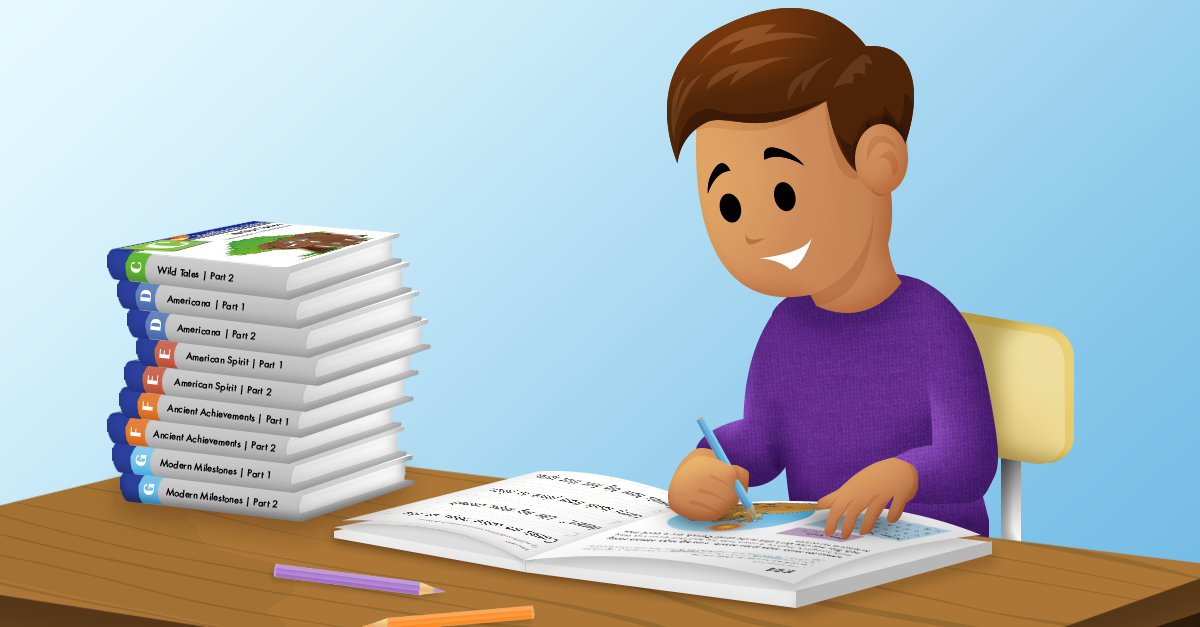
One of the beauties of using Spelling You See is the ability to move at a child’s individual pace.
If a student is taking a little more time to understand a concept, you can simply slow down and offer more practice; if he demonstrates understanding, you can move ahead. Some subject areas, such as math and grammar, are easy to adjust, but some, like spelling, are a little harder. How can you tell if a child has “mastered” spelling and is ready to move on? Specifically, how can you adjust the Spelling You See curriculum to fit your child’s individual pace?
If you read my previous blog post on spelling mastery, you’ll understand that this is a skill that develops over a long period of time, so it isn’t easy to assess after a single lesson or even a single level. However, as your child works through Spelling You See, there will be some clues that your child either needs to slow down or move a little more quickly. This blog post will look at these clues in the different levels and offer suggestions for ways to address them.
Listen and Write
In Listen and Write, children learn to associate letters and sounds by writing words with short vowels from dictation. Letter boxes are given to help them with this task. The level moves carefully through the following steps:
• Writing a three-letter word with all letters provided (Lessons 1-3)
• Writing a three-letter word with vowel provided (Lessons 4-5)
• Writing a three-letter word with vowel space shaded (Lessons 6-7)
• Writing three-letter words with no assistance (Lessons 8-15)
• Writing four-letter words with initial blends and diphthongs (Lessons 16-25)
• Writing four-letter words with ending blends and diphthongs (Lessons 26-29)
• Writing four-letter words with no assistance (Lessons 30-31)
• Writing five-letter words with medial vowel shaded (Lessons 32-34)
• Writing five-letter words with no assistance (Lessons 35-36)
Because so many skills are covered at this level, it’s important to stop after each lesson to assess how well your student is doing. Is your student struggling to complete the task, or does he need a lot of assistance? The answer is NOT to make the work sessions longer—10 minutes is the max! Instead, if the student is struggling near the beginning of the book, you should probably put it aside for a month or two and then try again. If he’s further along in the program, you can download additional letter box pages from your online resources and use the words from the General Dictation List for more practice sessions before moving on. Can your student spell nearly every word quickly and without error? You may want to consider skipping the remaining pages in that lesson and moving on to the next. The important thing is to make sure your student feels confident and demonstrates no anxiety before moving on to the next lesson.
Jack and Jill
The first half of Jack and Jill reviews and solidifies the skills presented in Listen and Write while adding the new skills of reading, copywork, and chunking. Watch your student carefully as she goes through the first few lessons. If you are near the beginning of the book and your child did not complete all of Listen and Write, you may need to go back to that book to build foundational skills. If you did complete Listen and Write previously, you will need to determine the specific skill that is causing difficulty. If it’s copywork, remember to keep the time relaxed and limited to 10 minutes, even if your student can only copy a few words. Remember to celebrate success! If the issue is letter box dictation, you can download additional letter box pages from your online resources and use the words from the General Dictation List for more practice sessions before moving on. Whatever you decide, do NOT make your child’s work sessions longer—10 minutes is the max!
Students who struggle in the second half of the course generally have difficulty transitioning to passage dictation. Again, it’s important to limit these sessions to 10 minutes, celebrating what the child is able to accomplish during that time. Be sure to watch the demonstration video on passage dictation (available in your online resources) to see how Dr. Holinga conducts these sessions. Also, be sure to take time for the No Rule Day activities—they will help keep spelling fun and minimize stress.
On the other hand, if your student can spell nearly every word quickly and without error, you may want to consider skipping the remaining pages in that lesson and move on to the next. Once again, the goal is for the child to feel comfortable and confident as he continues through the level.
Wild Tales through Modern Milestones
As you work through these levels, it is very important that you follow the program as it is designed. Generally students struggle or lose interest simply because well-meaning parents make significant alterations, such as skipping one or more of the core activities, adding in phonics rules, requiring the student to complete each dictation, focusing on errors, or using the book for handwriting instruction. If you have any questions about how the program is meant to be used, please contact a Customer Service representative for assistance.
Given the fact that growth does tend to come in spurts, you will also want to assess your student’s progress at the end of every lesson. Was he able to chunk the passages accurately, without error or assistance? Was the first dictation practically flawless? Then it might be possible to move a little more quickly through the level. Try the A and B pages of the next lesson, and if your student does well, skip the C page. Then try the first dictation without assistance; if the student completes it confidently with few errors, skip the second dictation and move to the next lesson. Once again, use your student’s confidence as a guide in deciding whether you should move more quickly through the level.
Spelling You See is a carefully crafted, research-based program designed to help students learn to spell confidently and accurately. While it is meant to be followed exactly, there is room to adjust the pacing to meet the needs of your individual student. While spelling mastery doesn’t happen overnight, as you continue to use Spelling You See, you will eventually see your child become a clear and confident communicator.




Leave a Reply